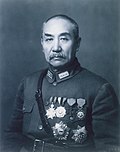| |||||||||||||||||||||||||||||||||||||||||||||||||||||||||||||||||||||
196 seats (of 200 seats) to the Advisory Council 101 seats needed for a majority | |||||||||||||||||||||||||||||||||||||||||||||||||||||||||||||||||||||
|---|---|---|---|---|---|---|---|---|---|---|---|---|---|---|---|---|---|---|---|---|---|---|---|---|---|---|---|---|---|---|---|---|---|---|---|---|---|---|---|---|---|---|---|---|---|---|---|---|---|---|---|---|---|---|---|---|---|---|---|---|---|---|---|---|---|---|---|---|---|
| |||||||||||||||||||||||||||||||||||||||||||||||||||||||||||||||||||||
 Constitutionalist majority Independent majority Divided between constitutionalists and independents Divided between constitutionalists and revolutionaries No election | |||||||||||||||||||||||||||||||||||||||||||||||||||||||||||||||||||||
The 1909 Chinese parliamentary election was an indirect election to the first imperial Advisory Council, a preparatory body of the parliament created under the constitutional reform bought by the late Qing dynasty. It was seen as the first popular election in Chinese history. [1]
Contents
Originally 100 members, half of the seats in the council were to be elected by the members of the Provincial Consultative Assemblies, while the other half were appointed by the Emperor. Due to the fact the Provincial Consultative Assembly had not been set up in Sinkiang, the seats were reduced to 98.
Translations with bracketed Chinese text are for reference only.






